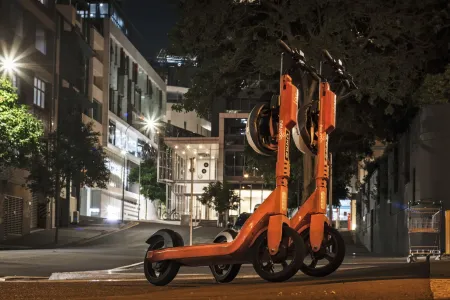Footpaths the “wild-west” for pedestrians due to lawless e-scooter boom, expert warns
Lack of regulation around e-scooters across the country leaves pedestrians vulnerable as safety concerns over electronic scooters rise, a Charles Darwin University (CDU) expert warns.
CDU Lecturer in Law Dr. Ciprian Radavoi, has been researching the rights and responsibilities between pedestrians and e-scooters and the level of enforcement of speed limits and safety rules, which vary significantly across Australian cities when it comes to using e-scooters.
According to Dr Radavoi, from the Asia Pacific College of Business and Law, the regulatory framework for e-scooters in Australia has been designed almost exclusively with the e-scooter rider’s safety and comfort in mind, which leaves vulnerable people at risk because of poor and unenforced rules around e-scooter use on footpaths.
“Pedestrians, people in wheelchairs, or cultural and ethnic groups who traditionally socialise on footpaths have been largely ignored by the policymakers,” Dr Radavoi said.
“I decided to do this research when noticing how the life of pedestrians, people who use wheelchairs, and Aboriginal groups in Darwin has become more difficult with the hundreds of e-scooters rushing on the footpath, often honking at other footpath users to clear the way.”
Dr Radavoi said there was something wrong with how the rules were made.
“There are problems from allowing heavy machines to drive at high speeds among vulnerable individuals, to allowing e-scooters to be abandoned randomly after use, hindering pedestrian and wheelchair traffic, and creating a risk of accidents,” he said.
Dr Radavoi said the poor design and enforcement of e-scooter rules result from the lack of a transparent process of balancing competing interests between e-scooter users and pedestrians.
The growth of e-scooters has grown significantly across Australia.
According to market research company Prescient and Strategic Intelligence, the micro-mobility market is worth about $16.9 million, but is expected to increase to $19 billion in 2030.
However, according to Dr Radavoi, e-scooter use will only fulfill its potential if it is managed responsibly and safely for businesses, councils, e-scooter riders, vulnerable community members, and other footpath users.
The paper was published in the Alternative Law Journal https://journals.sagepub.com/doi/10.1177/1037969X221108806
Related Articles

First “hype cycle” of AI development put tech above humans
Users around the world have rushed to adopt artificial intelligence - especially in safety-critical fields - but a new study has revealed the hype has prioritised technology for technology’s sake instead of human-centred development.
Read more about First “hype cycle” of AI development put tech above humans
Nanoplastics hindering cognitive abilities of fish, international research shows
Nanoplastic exposure can impair the cognitive abilities of fish and could lead to significant impacts on marine species’ ability to survive, according to a new international study.
Read more about Nanoplastics hindering cognitive abilities of fish, international research shows
New project to grow Indigenous aquaculture on one of Australia’s largest islands
An Australian island’s efforts to improve food security and transition into a blue economy will be bolstered by a new project to propagate a nutritious and increasingly popular fish.
Read more about New project to grow Indigenous aquaculture on one of Australia’s largest islands
